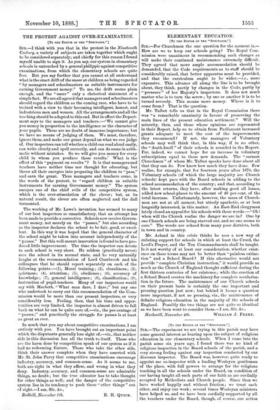ELEMENTARY EDUCATION.
[To THE EDITOR OF THE " SracrATors."] SIR,—For Churchmen the one question for the moment is,— How are we to keep our schools going? The Royal Com- mission were unanimous in recommending such changes as will make their continued maintenance extremely difficult. They agreed that more ample accommodation should be demanded, that the Code requirements as to staff should be considerably raised, that better apparatus must be provided, and that the curriculum ought to be wider,—i.e., more expensive. This advance all along the line is to be brought about, they think, partly by changes in the Code, partly by " pressure " of her Majesty's inspectors. It does not much matter who is to turn the screw ; by one or another it is to be turned severely. This means more money. Where is it to come from ? That is the question.
Mr. Talbot tells as that in the Royal Commission there was "a remarkable unanimity in favour of preserving the main lines of the present education settlement." Will the minority, then, and those whose opinions are represented in their Report, help us to obtain from Parliament increased grants adequate to meet the cost of the improvements they recommend ? If not, the managers of Voluntary schools may well think that, in this way, if in no other, the " death-knell " of their schools is sounded in the Report. For, indeed, we cannot hope for an increase in voluntary subscriptions equal to these new demands. The "earnest Churchmen" of whom Mr. Talbot speaks have done about all that they can do. Few know how much they have done. Few realise, for example, that for fourteen years after 1870, the Voluntary schools (of which the large majority are Church schools) kept pace with the Board schools in adding to the school accommodation of the country; and that, according to the latest returns, they have, after making good all losses, added new school-places to the amount of 48 per cent. of the total increase. Unfortunately, however, the mass of Church- men are not at all earnest, but utterly apathetic, or at best languidly interested, in this matter. An East-End clergyman lately closed an appeal for his schools with these words :—" Oh! when will the Church realise the danger we are in ? One by one Church schools are being starved out, and no one seems to care." The words are echoed from many poor districts, both in town and in country.
Mr. Acland in this crisis thinks he sees a new way of enlisting support for schools in which at least the Creed, the Lord's Prayer, and the Ten Commandments shall be taught. Is it not worthy of at least our consideration, whether exist- ence on these terms may not be better than "painless extinc- tion" and a School Board ? If this alternative would not provide "complete Christian instruction," it would provide as much as the Church of England thought sufficient during the first thirteen centuries of her existence ; while the erection of a School Board creates the machinery for complete secularisa- tion in the future. The maintenance of our Church schools on their present basis is certainly the one important and pressing question just now; but behind it looms a question more important, if not so pressing, viz., the maintenance of definite religious education in the majority of the schools of England. Possibly the two things are not quite so identical as we have been wont to consider thew.—I am, Sir, &c.,






































 Previous page
Previous page